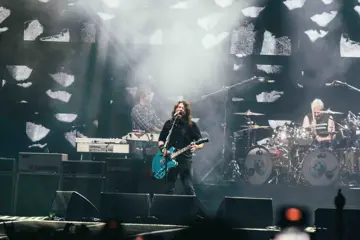Rising from the ashes of beloved angular Sydney rockers Purplene, Charge Group made an understated introductory testimonial in the form of their esoteric debut, Escaping Mankind, back in 2008. It was clear from the outset that the quartet – Purplene's singer/guitarist Matt Blackman, bassist Adam Jesson and drummer Matt Rossetti, now joined by Jason Tampake on violin – wanted to move on from their former exploits and carve out a different niche in the Australian musical landscape uniquely their own. With their eponymous second record, Charge Group has deviated further from their raw-boned origins and in doing so has succeeded in creating an intricate work that rivals the brilliance of anything they have previously done.
“Of course the band is going to have similarities to (Purplene) – it's largely my songwriting, my voice, the same drummer, the same bass player – yet the sound makes a huge departure from that sound,” Blackman explains. “It's coming from a different place in terms of the kind of people we are now, the life experiences and growth that's taken place compared to who we were then. We have essentially become stronger; have managed to whittle away the dead wood. Nothing had the same spark that these new songs tend to have for us.”
Such admissions denote a sense of release from the strictures of the past and excitement in embracing the future. Blackman admits that it's the years of growing up alongside one another that has allowed them to mature into their current guise and gain the poise to take risks, both personally and sonically.
“It's really been a combination of confidence in what we do and with our instruments, us as musicians and us as friends. I find it takes a lot of time to completely ease into opening up to the chaos of music. As soon as you start learning how to play, there's a tendency to try and play well and not fuck up, to play efficiently, as opposed to taking things into a far more exciting direction. We had to allow ourselves to say, 'Let there be mayhem, let there be chaos, let's walk on a tenuous tightrope that could go either way.' I've found it so much more exciting walking that fine line, being unafraid. The more experienced you get, you can get comfortable – there is the threat to become a little bit safe, a little bit naff. That is always disappointing, when a band gets better at what they do and then fail to see it through to a logical conclusion, preferring to stay in their own bubble. I think we have broken out of that.”
Don't miss a beat with our FREE daily newsletter
It's all well and good to throw caution to the wind, but there needs to be a degree of control, or at least an end goal, so that such “chaos” can be harnessed into a tangible whole. Blackman admits that it took reflection on Charge Group's debut to reassess what it was they all wanted to achieve and then act accordingly.
“It's surprising really, we had to learn to listen to each other and simplify our ideas. In order to grow as a group, we had to know what each other's strengths and weaknesses were. It all comes from continual playing and touring. When we toured around Europe (in 2010) we came across the notion of wanting to make an impact when playing live that you mightn't think about when you are playing in each other's lounge rooms. Most of the songs on (Escaping Mankind) were written by me in my bedroom post-Purplene, even towards the end of Purplene, so they had no particular focus, no planned outcome. We merely worked out band arrangements around those skeletal ideas. Much of what we have done since is expressly at face value – we play to each other, listen to one another at volume, learning how to respond to one another. Charge Group really is the first instance of us as a true band, as it is meant to be.”
This growth in confidence and dynamics is evident throughout Charge Group, as the quartet show great dexterity and experimentation within generic song structures that allows them to mine new sonic ground. The beauty inherent in much of the album came from a restrained, patient approach to songwriting, another element that was somewhat foreign to Blackman.
“A major aspect of making this record was not to rush it. We had to be patient and willing to whittle away the things we felt didn't work or didn't feel just right. We hired a small church space instead of a studio to record the album for that express purpose. That pressure to beat the clock and save coin is alleviated. See, I've always liked the analogy of the old Japanese master craftsmen who made these beautiful timber water birds, and when asked how he managed to make them so intricately, he replies, 'I just remove the parts that don't look like a waterbird.' So I've tried to keep things as simple as that, and rather than going in with these grand ideas, having big epic rock with these beautiful quiet moments, I sit with the songs and wait for them to reveal themselves.”
When a song reveals itself, though, it can come from the least expected angle, which was the case with single, Run, a predominantly instrumental number that was extrapolated from one of those moments that are more accidental than premeditated, which in itself accentuates their propensity to let chaos reign.
“It really came down to each individual song in how things would fit together,” Blackman elaborates. “Run is an example of a song where it all evolved in the recording process. It was a fun jam that Jason and I were having that became this high-octane jam that really took our breaths away. Afterwards we just looked at each other and said, 'Holy shit!' We had recorded it too, and as I listened to it as I drove home these images of psych chase scenes and weird little dances came to mind.
“So when the lyrical content came in it was as an additional instrument; it was a secondary element. That was a nice way to approach lyrics also because it's the most human element; it's what our ear picks up and focuses on the most in any given song. Therefore it's difficult to have it behind the music – if you are going to hide or distort the voice, then the point has been lost. It may as well be disposable rubbish. Therefore there is so much care and attention most of the time in what I write and sing, and even moreso on this record, to match the beauty and intricacy of the arrangements – but Run was like the antithesis of that. It's the exception that proves the rule for us.”















